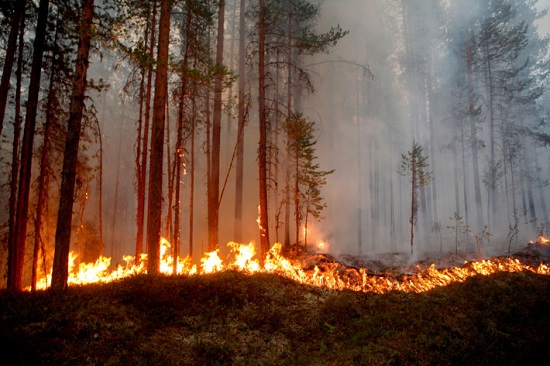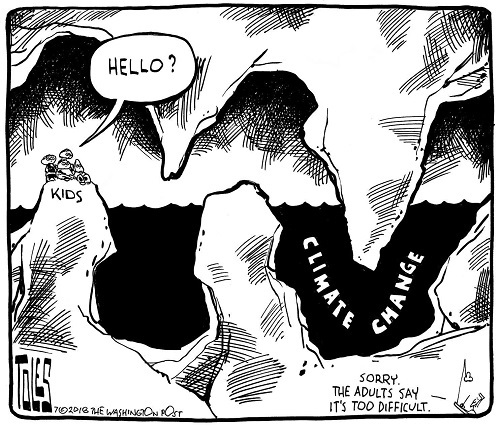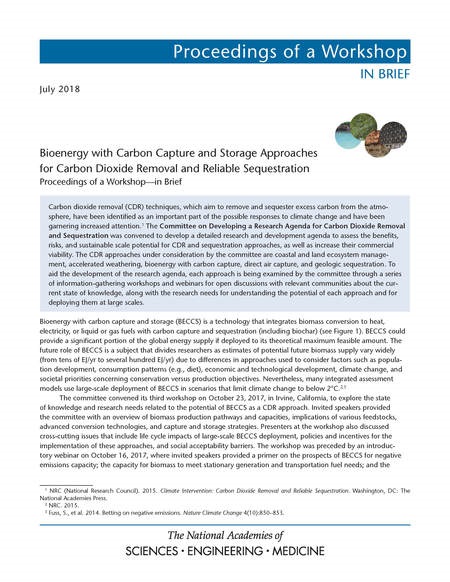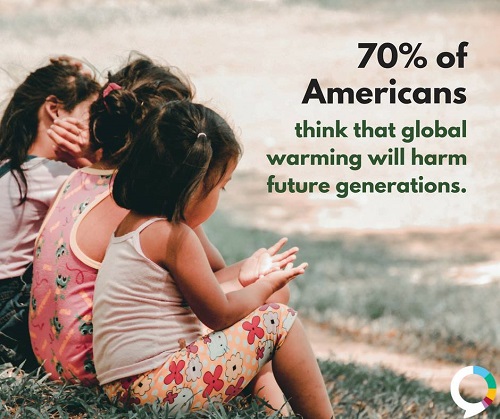Story of the Week... Analysis of the Week... SkS Highlights... El Niño/La Niña Update... Toon of the Week... Quote of the Week... Graphic of the Week... SkS in the News... Photo of the Week... SkS Spotlights... Video of the Week... Reports of Note... Coming Soon on SkS... Poster of the Week... SkS Week in Review...
Story of the Week...
A Global Heat Wave Has Set the Arctic Circle on Fire

Fire burns in Karbole, Sweden. Photo: Mats Andersson/AFP/Getty Images
From Japan to Sweden, and Oman to Texas, a global heat wave is setting records, igniting wildfires, and killing dozens all across the world this week.
The south-central region is home to the highest temperatures in the U.S. this week, with nearly 35 million people living under excessive heat warnings issued by the National Weather Service. Temperatures are expected to be in the triple digits across Texas this weekend, marking the most severe heat wave in the state since 2011.
The Texas heat has already led to record-breaking days for the Texas power grid twice this week. Things aren’t any better elsewhere in the region, with heat indexes in Oklahoma, Arkansas, and Louisiana reaching up to 110 degrees.
A Global Heat Wave Has Set the Arctic Circle on Fire by Adam K Raymond, Daily Intelligencer, New York Magazine, July 20, 2018
Analysis of the Week...
The 5 most important questions about carbon taxes, answered
Carbon taxes are in the news these days. In recent months, not one but two conservative national carbon tax proposals have emerged, disrupting the usual partisan dynamic on climate policy.
First there was the proposal from the Climate Leadership Council, a group of (mostly older, retired) Republicans and centrists, which was released last year but recently gained the backing of a new big-money conservative PAC. And next week, Rep. Carlos Curbelo (R-FL), co-chair of the House Climate Solutions Caucus, plans to release a carbon-tax proposal of his own.
Neither proposal has a snowflake’s chance in hell of passage any time soon. And on Thursday, the House passed a resolution trying to squash even the possibility of a carbon tax. But the existence of these proposals does indicate a heightened level of awareness of and interest in carbon taxes. So now seems like a good opportunity to review some of the basics.
The 5 most important questions about carbon taxes, answered by David Roberts, Energy & Environment, Vox, July 20, 2018
Toon of the Week...

Quote of the Week...
“The red alert is on,” Laurent Fabius, who was president of the 2015 international climate change negotiations in Paris, told an audience last week at the EuroScience Open Forum, Europe’s largest interdisciplinary science meeting. As of 2015, global temperatures had risen about 1 degree Celsius above pre-industrial levels. “It’s a race against time,” Fabius said, and the political challenge is to avoid acting too late.
What Climate Change Looks Like In 2018 by Christie Aschwanden, Climate, FiveThirtyEight, July 19, 2018
SkS in the News...
Carolyn Kormann interviewed John Cook for her New Yorker magazine article, In Andrew Wheeler, Trump Gets a Cannier E.P.A. Chief. Cook's observations are contained in this paragraph:
Wheeler has long been a climate denialist, fighting any policies that would establish mandatory carbon limits. In 2003, in a long speech on the Senate floor opposing a climate bill put forward by Senators John McCain and Joe Lieberman, Inhofe famously said that “man-made global warming is the greatest hoax ever perpetrated on the American people.” Wheeler defended his boss’s position for years, criticizing the work of the Intergovernmental Panel on Climate Change and casting doubt on the science. (In 2006, he said in an interview with E&E News, “The fact is that the climate changes regularly.”) On Friday, however, in an interview with the Washington Post, Wheeler changed his position—or, at least, chose his words carefully. He said that he believes climate change is real and that “people have an impact on the climate.” (During his Senate confirmation hearings for deputy administrator, last November, he expressed more uncertainty. “I believe man has an impact on the climate,” he said. “But what is not completely understood is what the impact is.”) John Cook, a climate-change communications researcher at George Mason University, categorizes this kind of statement as “doubt-mongering misinformation,” Republicans’ latest argument, he told me, to support climate inaction. (Previously, Wheeler and others used the “explicit misinformation” argument, Cook said. “It seems to be on its way out.”) Wheeler now claims, as he told the Post, that he has “always deferred to career scientists,” and will continue to do so. In his first e-mail to E.P.A. employees as acting administrator, last week, he wrote, “I look forward to working alongside all of you to continue our collective goal of protecting public health and the environment.”
In his New York Times article, He Sues to Discredit Climate Scientists. Now He’s Being Sued by His Allies., John Schwartz wrote:
The efforts by Mr. Schnare and Mr. Horner to obtain climate scientists’ emails followed a trail blazed in 2009 in an episode known as Climategate, when hackers exposed a trove of private messages between scientists. Global warming denialists took the blunt discussions out of context to allege that researchers had tampered with data, but subsequent investigations found no evidence of fraud.
The first link in the above is to the Basic version of the SkS rebuttal article, Clearing up misconceptions regarding 'hide the decline'
Reports of Note...

Coming Soon on SkS...
- Scientists detect a human fingerprint in the warming of the atmosphere (John Abraham)
- Wind Energy: What About Those Subsidies? And, the Key Advantage over Natural Gas (greenman)
- Facebook video spreads climate denial misinformation to 5 million users (Dana)
- CSLDF is fighting attacks on science. Here’s how you can help (Lauren Kurtz)
- Permafrost and wetland emissions could cut 1.5C carbon budget ‘by five years’ (Robert McSweeney)
- 2018 SkS Weekly Climate Change & Global Warming News Roundup #30 (John Hartz)
- 2018 SkS Weekly Climate Change & Global Warming Digest #30 (John Hartz)
Poster of the Week...

SkS Week in Review...
- 2018 SkS Weekly Climate Change & Global Warming News Roundup #29 by John Hartz
- 97% of House Republicans foolishly reject carbon taxes by Dana Nuccitelli (Climate Consensus - the 97%, Environment, Guardian)
- Ocean Temperature - Part 2 by Irek Zawadzki
- How Wind Turbines Bolster Rural America by greenman360 (Climate Denial Crock of the Week with Peter Sinclair)
- SkS Analogy 13 - Water glasses and Greenhouse gases by evan & jg
- Comprehensive study: carbon taxes won't hamper the economy by Dana Nuccitelli (Climate Consensus - the 97%, Environment, Guardian)
- 2018 SkS Weekly Climate Change & Global Warming Digest #28 by John Hartz
from Skeptical Science https://ift.tt/2mz33AX
Story of the Week... Analysis of the Week... SkS Highlights... El Niño/La Niña Update... Toon of the Week... Quote of the Week... Graphic of the Week... SkS in the News... Photo of the Week... SkS Spotlights... Video of the Week... Reports of Note... Coming Soon on SkS... Poster of the Week... SkS Week in Review...
Story of the Week...
A Global Heat Wave Has Set the Arctic Circle on Fire

Fire burns in Karbole, Sweden. Photo: Mats Andersson/AFP/Getty Images
From Japan to Sweden, and Oman to Texas, a global heat wave is setting records, igniting wildfires, and killing dozens all across the world this week.
The south-central region is home to the highest temperatures in the U.S. this week, with nearly 35 million people living under excessive heat warnings issued by the National Weather Service. Temperatures are expected to be in the triple digits across Texas this weekend, marking the most severe heat wave in the state since 2011.
The Texas heat has already led to record-breaking days for the Texas power grid twice this week. Things aren’t any better elsewhere in the region, with heat indexes in Oklahoma, Arkansas, and Louisiana reaching up to 110 degrees.
A Global Heat Wave Has Set the Arctic Circle on Fire by Adam K Raymond, Daily Intelligencer, New York Magazine, July 20, 2018
Analysis of the Week...
The 5 most important questions about carbon taxes, answered
Carbon taxes are in the news these days. In recent months, not one but two conservative national carbon tax proposals have emerged, disrupting the usual partisan dynamic on climate policy.
First there was the proposal from the Climate Leadership Council, a group of (mostly older, retired) Republicans and centrists, which was released last year but recently gained the backing of a new big-money conservative PAC. And next week, Rep. Carlos Curbelo (R-FL), co-chair of the House Climate Solutions Caucus, plans to release a carbon-tax proposal of his own.
Neither proposal has a snowflake’s chance in hell of passage any time soon. And on Thursday, the House passed a resolution trying to squash even the possibility of a carbon tax. But the existence of these proposals does indicate a heightened level of awareness of and interest in carbon taxes. So now seems like a good opportunity to review some of the basics.
The 5 most important questions about carbon taxes, answered by David Roberts, Energy & Environment, Vox, July 20, 2018
Toon of the Week...

Quote of the Week...
“The red alert is on,” Laurent Fabius, who was president of the 2015 international climate change negotiations in Paris, told an audience last week at the EuroScience Open Forum, Europe’s largest interdisciplinary science meeting. As of 2015, global temperatures had risen about 1 degree Celsius above pre-industrial levels. “It’s a race against time,” Fabius said, and the political challenge is to avoid acting too late.
What Climate Change Looks Like In 2018 by Christie Aschwanden, Climate, FiveThirtyEight, July 19, 2018
SkS in the News...
Carolyn Kormann interviewed John Cook for her New Yorker magazine article, In Andrew Wheeler, Trump Gets a Cannier E.P.A. Chief. Cook's observations are contained in this paragraph:
Wheeler has long been a climate denialist, fighting any policies that would establish mandatory carbon limits. In 2003, in a long speech on the Senate floor opposing a climate bill put forward by Senators John McCain and Joe Lieberman, Inhofe famously said that “man-made global warming is the greatest hoax ever perpetrated on the American people.” Wheeler defended his boss’s position for years, criticizing the work of the Intergovernmental Panel on Climate Change and casting doubt on the science. (In 2006, he said in an interview with E&E News, “The fact is that the climate changes regularly.”) On Friday, however, in an interview with the Washington Post, Wheeler changed his position—or, at least, chose his words carefully. He said that he believes climate change is real and that “people have an impact on the climate.” (During his Senate confirmation hearings for deputy administrator, last November, he expressed more uncertainty. “I believe man has an impact on the climate,” he said. “But what is not completely understood is what the impact is.”) John Cook, a climate-change communications researcher at George Mason University, categorizes this kind of statement as “doubt-mongering misinformation,” Republicans’ latest argument, he told me, to support climate inaction. (Previously, Wheeler and others used the “explicit misinformation” argument, Cook said. “It seems to be on its way out.”) Wheeler now claims, as he told the Post, that he has “always deferred to career scientists,” and will continue to do so. In his first e-mail to E.P.A. employees as acting administrator, last week, he wrote, “I look forward to working alongside all of you to continue our collective goal of protecting public health and the environment.”
In his New York Times article, He Sues to Discredit Climate Scientists. Now He’s Being Sued by His Allies., John Schwartz wrote:
The efforts by Mr. Schnare and Mr. Horner to obtain climate scientists’ emails followed a trail blazed in 2009 in an episode known as Climategate, when hackers exposed a trove of private messages between scientists. Global warming denialists took the blunt discussions out of context to allege that researchers had tampered with data, but subsequent investigations found no evidence of fraud.
The first link in the above is to the Basic version of the SkS rebuttal article, Clearing up misconceptions regarding 'hide the decline'
Reports of Note...

Coming Soon on SkS...
- Scientists detect a human fingerprint in the warming of the atmosphere (John Abraham)
- Wind Energy: What About Those Subsidies? And, the Key Advantage over Natural Gas (greenman)
- Facebook video spreads climate denial misinformation to 5 million users (Dana)
- CSLDF is fighting attacks on science. Here’s how you can help (Lauren Kurtz)
- Permafrost and wetland emissions could cut 1.5C carbon budget ‘by five years’ (Robert McSweeney)
- 2018 SkS Weekly Climate Change & Global Warming News Roundup #30 (John Hartz)
- 2018 SkS Weekly Climate Change & Global Warming Digest #30 (John Hartz)
Poster of the Week...

SkS Week in Review...
- 2018 SkS Weekly Climate Change & Global Warming News Roundup #29 by John Hartz
- 97% of House Republicans foolishly reject carbon taxes by Dana Nuccitelli (Climate Consensus - the 97%, Environment, Guardian)
- Ocean Temperature - Part 2 by Irek Zawadzki
- How Wind Turbines Bolster Rural America by greenman360 (Climate Denial Crock of the Week with Peter Sinclair)
- SkS Analogy 13 - Water glasses and Greenhouse gases by evan & jg
- Comprehensive study: carbon taxes won't hamper the economy by Dana Nuccitelli (Climate Consensus - the 97%, Environment, Guardian)
- 2018 SkS Weekly Climate Change & Global Warming Digest #28 by John Hartz
from Skeptical Science https://ift.tt/2mz33AX

Aucun commentaire:
Enregistrer un commentaire